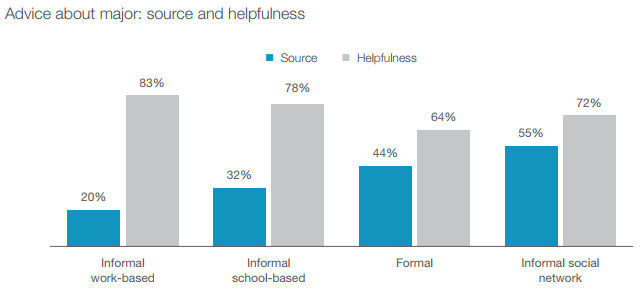Getting Into College is Just the Start

As we enter college admission season, new research indicates a critical, but under discussed fact: what you study in college can have a greater impact on your future than which college you attend. But as a parent of a high school senior I can tell you that the clear emphasis in the college application process is on getting in to a particular school, not the field in which you intend to study.
The stakes are high. According to research from Georgetown’s Center on Education and the Workforce, deciding one’s major often plays a bigger role in lifetime earnings potential than where that certificate or degree is earned. For instance, the difference between highest and lowest paying majors is $3.4 million in lifetime earnings. To put that number in perspective, the difference between life-time wages of high school and college graduates is $1 million.
Strada Education Network and Gallup are helpfully shining the spotlight on this issue through a series of national polls designed to penetrate how young people make their choices about colleges and, importantly, what they would do differently if they could go back and start over. Strada and Gallup’s initial findings from earlier in the summer were that a majority of U.S. adults would change at least one aspect of their higher education experience—major, degree or institution—if they could do it over again. The desire to change major was particularly significant for adults with some college, but no degree.
Now they’ve released a new report, Major Influence: Where Students Get Valued Advice on What to Study in College, that illuminates the gap in access to information that students face when trying to make critical decisions about their pathways through college. To put it succinctly: the sources of information considered most reliable are the least accessible, especially to minority, low-income and first-generation students.
The report finds that work-based sources of information—that is, people who are in the workforce—are the most valued when it comes to advising young people on choosing a college pathway and major. They have first-hand knowledge of the skills and credentials needed in their fields. Informal networks, often accessed via family members and friends, are also highly valued. Unfortunately, first gen and low-income students have less access to these information sources, which puts them at an even greater disadvantage.
What these students do have access to is what the report calls “formal” information sources—high school guidance counselors and college advisors. These individuals have a crucial role to play in supporting the decision-making of students, yet they aren’t rated as highly in terms of the quality of the advice they’re providing. Where does this leave students who rely on “the system” for help?
While counselors are a critical part of the solution, and they need to be better armed to support students, what we’re learning from the new studies is that getting access to people outside the formal system is also important. That means opening the doors to greater work-based learning opportunities in high school and college. It also means creating easy-to-access tools that both highlight career and earning opportunities by majors and facilitate student connections with individuals in their fields of interest.
In our work with states to advance career readiness through the New Skills for Youth initiative, there is a growing appetite for strategies to improve career advising. In fact, it’s the most highly sought-after topic of information in the project’s resource center.
It’s time to think outside the box when it comes to college and career counseling. We need to provide high school and college students with access to better information and we need to help everyone involved in the process understand that getting into college is just the start.



